Associate Consultants
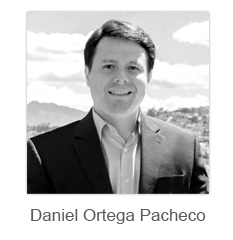
Daniel Ortega Pacheco
Dr. Ortega is Director of the Center for Public Policy Development at ESPOL, a think-and-do tank who promotes the integration of sustainability in multilevel policy and planning in the public and private sector. He holds a PhD in Public Policy and Administration from Ohio State University. Former Minister of Environment and member of the Council of the Global Environment Facility and the Executive Board of the United Nations Clean Development Mechanism. Author of academic publications on climate policy, bioeconomy and sustainable finance. He is the coordinator of the Sustainable Finance Initiative, a platform that brings together leading national and international actors from the public, private and academic sectors to promote access to finance and impact investment in environmental, social and corporate governance issues. He leads the development of the Executive Training Program in Sustainable Finance that will train banks to issue Social and Sustainable Green Bonds with the support of multilateral agencies at ESPAE- Business School of ESPOL. He has received an award for research on the state of the art of this trend in the region in collaboration with the Universidad de los Andes in Colombia and Tecnológico de Monterrey from the Impact & Sustainable Finance Faculty Consortium of the Kellogg School of Management - Northwestern University.
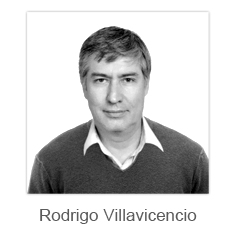
Rodrigo Villavicencio
Rodrigo has been working for 28 years as an expert in sustainable development, risk prevention, emergency response, and climate change. He has held positions as National Program Officer, Project Coordinator, and Consultant, for bi- and Multilateral International Agencies, such as Swiss Cooperation (14 years with the Swiss Embassy in Bolivia 2005-2019), German Cooperation (GIZ), European Union (EU), U.S. Agency for International Development (USAID), Inter-American Development Bank (IDB), etc. He obtained a Master of Science in International Agricultural Development at the Technical University of Berlin and specialized in participatory methodologies, risk prevention, emergency response, and climate change. He managed a portfolio of projects to support Swiss cooperation in Bolivia for Integrated Water Management, Clean Air, Disaster Risk Prevention, and Climate Change. He also participated in the development of planning tools that consider the cost-benefit of risk prevention and climate change adaptation measures to contribute to a more resilient development in the face of climate change impacts.
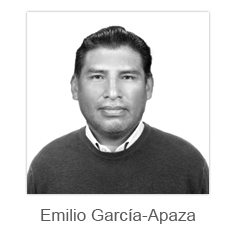
Emilio Garcia Apaza
Emilio holds a Doctorate of Science from the University of Alicante in Spain, specializing in Management of Ecosystems and Biological Diversity; as well as a Masters of Science in Arid and Semi-arid Land Development from the Ben Gurion University of the Negev in Israel. He holds a degree in Agricultural Engineering from the Universidad Mayor de San Andrés (UMSA) and a diploma in Pedagogical Organization and Administration in Higher Education. He is a post-graduate and undergraduate professor at the Universidad Mayor de San Andrés, Military School of Engineering, Bolivian Catholic University, CIDES-UMSA, Naval War School, and Loyola University, all in the area of Natural Resources and Environment. He has worked in rural development projects throughout different public and private institutions, both nationally and internationally. He has published more than 100 scientific articles, books, and conference proceedings on environmental issues. He has been a consultant in Greenhouse Gas Inventories for the National Climate Change Program (PNCC) by the Ministry of Environment and Water, and an expert in the Adaptation of Food Security and Rural Development for Climate Change program as part of the National Scheme for Adaptation to Climate Change, and finally as coordinator of development projects. He is part of the roster of the Intergovernmental Panel on Climate Change (IPCC) and the United Nations Framework Convention on Climate Change (UNFCCC) in the Agricultural and Forestry sectors. He is currently a professor at the Faculty of Agronomy in the Agronomic Engineering Program at the Universidad Mayor de San Andrés (UMSA) in the subject of Agricultural Production Systems.
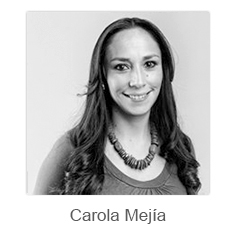
Carola Mejía
Carola is an economist with a master's degree in Development Economics, specializing in Sustainable Development, with 16 years of experience as an advisor and consultant to public, private, and international cooperation institutions, with principal expertise in environmental projects, climate financing, and sustainable development in Latin America. She is an active member of the Climate Financing Group for Latin America and the Caribbean (GFLAC), the Latin American Observatory for Climate Action (OLAC), and co-coordinator of the Transformative Reactivation campaign. In recent months, she has been supporting SASA, Fundación Avina, and the Latin American Network of Economic and Social Justice (Latindadd) as an external consultant.
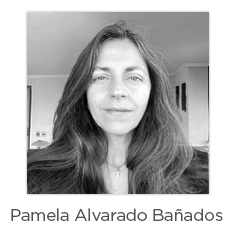
Pamela Alvarado Bañados
Industrial Civil Engineer with mention in systems, Master in Management and International Business. Specialist in process optimization, she has incorporated technology as an integral part of the improvement in all organizational areas, from the most traditional to organizations that optimize their environmental impact through technology. He has also obtained national and international awards in the implementation of management systems.


